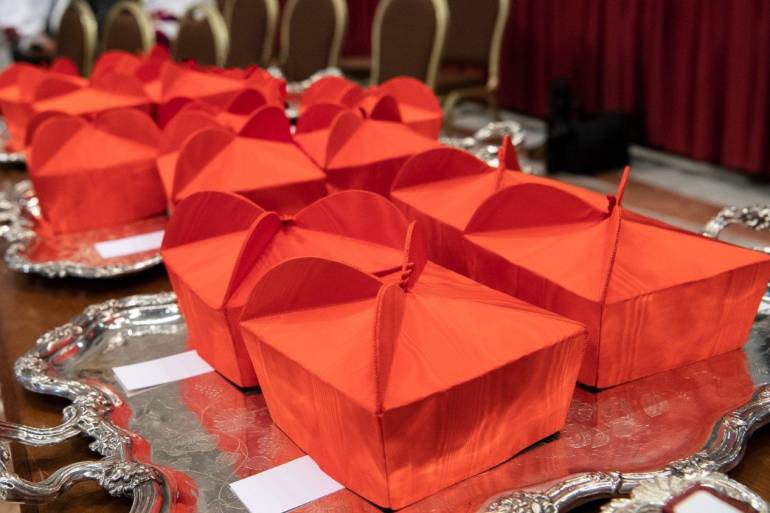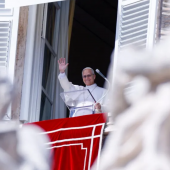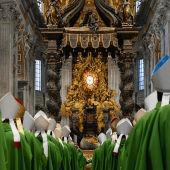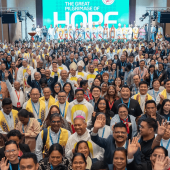Asia gets six new cardinals: A major boost for the Church on the periphery

Among the new cardinals announced on May 29, Asia stands out with six new names- continent-wise the highest. Besides the number, what strikes one is the places from where they are picked.
There was a time when cardinals used to be chosen from the major cities and capitals of countries. But Pope Francis’ fascination for the periphery continues to be reflected in the choice of the new cardinals. Six at one go is a first for Asia and a major boost as the Federation of Asian Bishops’ Conferences (FABC) celebrates the golden jubilee of its foundation in October this year.
Responding to the appointment of the new Asian cardinals, FABC President Cardinal Charles Maung Bo sdb remarked: “It is with great joy that we receive the news about the new cardinals announced by Pope Francis. In keeping with his quest for diversity and universality of the Catholic Church, the list reflects a wider spectrum of nations.
“It is also a moment of grace to the Asian Church. Six cardinals from Asia are named. The Asian Church, along with the African Church, emerges as the new focus of evangelization and hope of the new millennium. Religious life and vocations continue to be encouraging in these continents.
On behalf of the Bishops of the FABC, Cardinal Bo thanked the Holy Father for his pastoral vision for the Asian peoples and assured “wholehearted cooperation and zealous commitment to the message of Christ to the people of Asia.”
From among his 2020 appointments as cardinals from Asia was Bishop Cornelius Sim, Apostolic Vicar of the Vicariate of Brunei Darussalam, a small local church with just three parishes and about 20,000 faithful. But Sim, the first native priest from Brunei who was appointed Cardinal in October 2020, died in May 2021. The loss seems to be made good in some way by the choices of little-known prelates who heads small and big dioceses far from the big cities and countries of Asia.
Mongolia’s Giorgio Marengo, Apostolic Prefecture of Ulaanbaatar, who is announced as cardinal, is strategically located close to China. He heads a small Catholic community of little over 1,300 baptized. The Prefecture has 64 Catholic missionaries from 24 nationalities. The 46-year-old native of Italy, Marengo is probably the youngest in the whole College of Cardinals.
In contrast, Timor Leste’s Dili Archbishop Salesian Virgilio Do Carmo Da Silva heads an archdiocese with more than half a million faithful in the predominantly Catholic country of Asia.
Two of the five Asian cardinals hail from India, Filipe Neri Ferrão, the first from the former Portuguese colony of Goa, a predominantly Catholic region in Western India, and Archbishop Anthony Poola, the first Telugu to be appointed a cardinal, who heads the Hyderabad archdiocese in the East coast of India.
The fifth Asian bishop to be elevated to the rank of cardinal is Singapore’s William Goh, again a first for one of Asia’s leading and vibrant city-state with a huge migrant population. He is a native of Singapore and has a commendable record of inter-religious dialogue and pastoral leadership.
The sixth Asian to be elevated to the rank of cardinal is South Korean Archbishop Lazarus You Heung-sik. He was the bishop of Daejeon until 2021 when he was appointed as the Prefect of the Congregation for Clergy. 70-year-old You Heung-sik is the first Korean named to head a department of the Roman Curia.
There is yet another Cardinal-elect on the list with a close Asian connection. He is Salesian Luc Van Looy, who is bishop emeritus of Ghent in Belgium. Van Looy spent 12 years as a missionary in Korea and mastered the Korean language, before being chosen to the congregation’s leadership in Rome. He was sent to Ghent in his native Belgium as a bishop from which he retired in 2019. Van Looy is past 80 and is not eligible to vote in a conclave. Others in the 21-member list of new cardinals are from France, Nigeria, Brazil, USA, Italy, Ghana and Paraguay.
Among the six newly appointed Asian cardinals, all of them are way below the age limit of 80 which makes them eligible to vote in a conclave that will elect a successor to Pope Francis. In the growing decentralization of church leadership, Asian cardinals are going to have a decisive role in choosing the next pope.
The new cardinals will be officially installed in a ceremony known as a consistory in Rome on Aug 27. With the new appointments, Pope Francis has appointed 83 of the 133 cardinal electors, in what may be considered a decisive ‘Francis effect’ which will be reflected in the election of his successor.
The recent appointments by Pope Francis reflect what missiologists like David Bosch have predicted in the 1980s that there is a growing shift in the axis of Christianity from the West to the global South. The new appointments show that the landscape of the Catholic church and its leadership too are changing from the world's traditionally dominant west to the younger and emerging local churches in Africa and Asia.
At the beginning of the 20th century, an estimated 80 percent of the world’s Christian population lived in Europe and North America. In 1974 African theologian John S. Mbiti challenged western Christians to acknowledge the axis of Christianity had tilted southward because “the centers of the church’s universality” was moving away from Geneva, London, New York, and Rome, toward ‘Kinshasa, Buenos Aires, Addis Ababa, and Manila.”
Though terms like “world Christianity” and “global Christianity” first appeared in 1929 and 1943 respectively, a more realistic understanding of the demographic changes in the world Christian population emerged in the 1980s through the scholarship of David Barrett, Lamin Sanneh, David Bosch, Andrew Walls and others.
From a Christianity largely imported to Asia during the colonial period, and therefore still considered ‘foreign’, the church is becoming more local and indigenous. The native Christians in these countries no longer live in the shadows or margins of history but are decisive participants and active players in leadership, contextual expressions of faith, indigenous theologies, administration, and governance. Some missiologists emphasize the indigenous discovery of Christianity rather than the Christian discovery of indigenous societies by focusing on the many ways the faith is transformed and lived in a vastly different socio-cultural and religious context.
In predominantly multi-religious and cultural contexts of Asia, Christians are a minority in most countries, but they live in close contact with their neighbours of other faiths. There are also places where the Christian faith continues to be frowned upon as foreign, alien and inimical, and Christ’s disciples are treated with hostility. Even in such challenging situations, the faith and witness of the church and its services to all sections of people draw admiration and goodwill. Even amid the many difficulties which they encounter, Christians know that their faith must be lived in charity and hope with the adherents of other faiths at a truly profound and existential level.
Fr George Plathottam sdb is the Executive Secretary of the FABC Office of Social Communication
Radio Veritas Asia (RVA), a media platform of the Catholic Church, aims to share Christ. RVA started in 1969 as a continental Catholic radio station to serve Asian countries in their respective local language, thus earning the tag “the Voice of Asian Christianity.” Responding to the emerging context, RVA embraced media platforms to connect with the global Asian audience via its 21 language websites and various social media platforms.

















Glory be to the God on the highest. I'm proud to be an Asian (Indian).
- Reply
Permalink